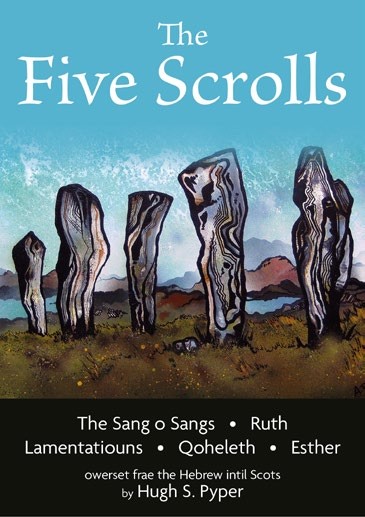FEATURE
The Five Scrolls
Jackie Macadam discovers the background to a new book translating books of the Old Testament from Hebrew into Scots.

Jackie Macadam
Forespiel
“Tae ma knawledge, nae complete owersettin o the Hebrew Bible, or Auld Testament, intae Scots frae the original Hebrew hes ivver been forthset. The Doric Aul Testament o Gordon M. Hay, forthset in 2023, a maisterfu labour o luve for the couthy Scots o the Nor-East, is foondet on English versions as is the skeely Scots renderin o the Auld Testament by James Scott Marshall that bides yet unforthset i the library o St Andrews University. A puckle buiks o the Bible in Scots hae kythed frae time tae time, but the feck o them hae been owerset frae English versions. The fowk wha micht hae produced a Scots Bible in the Reformatioun didna hae that as their priority. The Scots Reformers hed their een oan a reformed Britain, no juist Scotland. Mony o them hed trauchlet ower the Geneva Bible an hed mair tae dae than owerset the hale thing again, gien that ony Scots wha cuid read cuid mak dae wi English. Thereafter, King James VI commissiont his new version tae unite his twa kingriks an tae ding doun the Geneva Bible wi its fuitnotes that biggit up the richts o the fowk tae depose tyrants. The lest thing he needit wis a separate Scots Bible…”
SO begins the foreword to a new Scots language book written by Hugh Pyper, a retired professor of Bible Interpretation at Sheffield University who now lives in Orkney.
“
Even as a child, however, I was disturbed by the tendency to present biblical stories as if their sole point was to give an often rather trite moral lesson.
“I was born in Morningside in Edinburgh,” he explains. “My family attended Greenbank Parish Church and I was a keen member of its Sunday School and youth group and remain grateful to it for the grounding I received in the Bible. Even as a child, however, I was disturbed by the tendency to present biblical stories as if their sole point was to give an often rather trite moral lesson. I always felt that they were deeper and often darker than I was being told, and that fascinated me. In my late teens, I began to explore other churches and found a home in the Quaker meeting in Edinburgh.
“My father was interested in Scots poetry and would read to us in Scots. My mother was the daughter of a Fife farmer and had a rich fund of vocabulary and expressions which would come out on occasion, although she had been sent to Edinburgh to a school for young ladies and so was rather reticent about speaking Scots. We were exposed to a fair amount of Scots literature at school as well and I always relished the language.”
Hugh never lost his love for Scots as a language. “The distinction between a language and a dialect is hard to define,” he says. “It is bound up with questions of identity and politics rather than purely linguistic considerations. As the cliché has it, a language is a dialect with an army. At one time, Scots did have its own army, unlike many other varieties of what we broadly call English. It also has a distinctive literary tradition arising from the fact that at one time it was the language of a particular royal court and of an independent legal system.”
It was during the Covid-19 pandemic lockdown that Hugh decided to set about writing his book, The Five Scrolls.
“My model was the remarkable William Laughton Lorimer translation of the New Testament which he undertook because he felt that if Scots was to survive as a literary language it needed two things – a New Testament and a dictionary. His motivation was not religious, but literary, but he was a great Greek scholar as well as scholar of Scots, so his translation is both acute and fresh as he is not trammelled by other models. I have long felt that the next obvious step would be to translate the Old Testament or Hebrew Bible. There have been some translations done of individual books or passages, but no complete version has been published until Gordon Kaye’s recent Doric Aul Testament. However, most of these are based on English versions rendered into Scots. I realised that I was one of a rather small number of people who have a knowledge of both Biblical Hebrew and Scots and so, fully conscious of my own limitations, I decided to make an attempt. My aim was to show that Scots is fully capable of meeting the demands of the Hebrew, but also to show that the Hebrew text is full of a very similar virr and humanity to that which characterises the best of Scots literature.”
Hugh explains how he came to choose the ‘scrolls’ – The Song of Songs, Ruth, Lamentations, Esther and Ecclesiastes.
“I chose these five books for several reasons. They are a collection in the Jewish tradition with each book associated with a major festival and it is important to me to stress that these books are not simply part of the Christian Old Testament. They are Jewish books, and, beyond that, they are fascinating examples of ancient literature which are of interest to people of all faiths and none. They are short enough to be read in a sitting. They also display a great range of styles of writing from love poetry to lament to comic drama, which is an exciting challenge to a translator.

“I have always loved the Hebrew language and wanted a way to practise and extend my own understanding of it. There is nothing like translation to exercise those muscles. Having taught the Bible in Hebrew for many years, I am also aware that every translation is an interpretation, my own included. Translating from an English version into Scots is an interpretation of an interpretation and some of the older Scots versions are tied to English translations which have fallen out of favour. Oddly, there are also constructions and ways of phrasing things in Scots which are closer to the Hebrew than is the case with Standard English and so at times a Scots reader is getting more of a flavour of the Hebrew. This extends also to aspects of the sound of the language, where Scots can echo the guttural consonants and the pure vowels of the Hebrew. I also think Scots can convey something of the pawky humour of many of the texts which some English versions reduce to blandness.
“Some passages were very challenging,” he admits. “I made the decision when translating Lamentations to try and reproduce the acrostic structure of the Hebrew. Of the five chapters, four are so-called ‘alphabetic acrostics’, whereby the successive verses begin with the 22 successive letters of the Hebrew alphabet. Chapter 3, however, is a triple acrostic, meaning that the initial letters are repeated three times, not just once. Trying to reproduce that in Scots was quite a challenge!”
Writing The Five Scrolls has whetted Hugh’s appetite for more.
“There is quite a lot to tackle, so my next project will probably be the books from Judges to 2 Kings, covering the times of the judges and the monarchy. They are full of wonderful story-telling. Thereafter, the five books of the Torah, though that is a daunting prospect, and we will see how much time I have left!”
The book can be purchased from the publisher at https://handselpress.org.uk /product/thefive-scrolls/
It is also available through Amazon and through local bookshops.